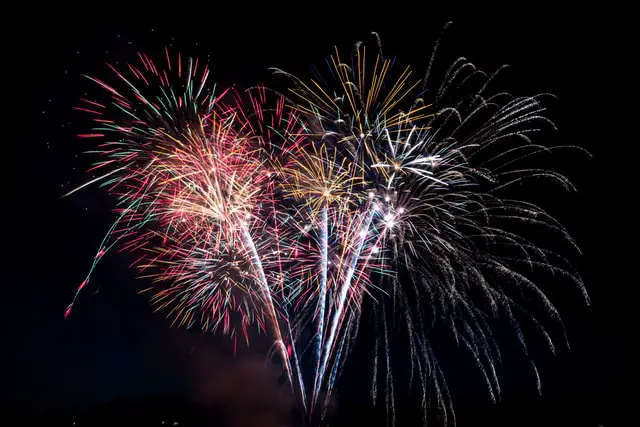This article will give you all of the knowledge you need on the Japanese word hanabi, including its Japanese definition and translation, example sentences, related expressions and more!
Contents
What does hanabi mean?
The Japanese word hanabi (花火, はなび) means fireworks. This word literally stands for fire flower, based on its two kanji (花 = flower, 火 = fire).
Hanabi have long been a part of Japanese culture. Some of the biggest fireworks festivals in Tokyo go back hundreds of years! They were originally thought to keep evil spirits away, but now feature in festivals that take place around the country every summer.
Without further ado, let’s look at some examples of how to use hanabi in a sentence.

Hanabi = Fireworks
To make it easier for you, I have written each sentence in full Japanese kanji in the first line, followed by roman letters (romaji), and hiragana, with the English meaning coming last.
僕は花火が大好き。
Boku wa hanabi ga daisuki.
ぼくははなびがだいすき。
I love fireworks.
昨日の花火は本当に素敵だった。
Kinou no hanabi wa hontou ni suteki datta.
きのうのはなびはほんとうにすてきだった。
Yesterday’s fireworks were really nice.
花火は9時から始まるそうです。
Hanabi wa ku ji kara hajimaru sou desu.
はなびはくじからはじまるそうです。
Apparently the fireworks start at 9pm.
Hanabi taikai: An awesome cultural experience
One of the coolest things about spending summers in Japan are the fireworks festivals, which are known as hanabi taikai (花火大会, はなびたいかい). These events are a great way to let your hair down and experience Japanese culture.
Japanese fireworks displays can last up to two hours. They also involve drinking (if that’s your thing) and eating delicacies from any number of yatai stalls. All in all, a great night out!
Many Japanese people wear yukata outfits to these festivals, which you can pick up fairly cheaply (from about ¥3,000) these days at places like Uniqlo and Don Quixote.
隅田川花火大会はとても有名です。
Sumidagawa hanabi taikai wa totemo yuumei desu.
すみだがわはなびたいかいはとてもゆうめいです。
The Sumidagawa fireworks display is really famous.
コロナの影響で今年の花火大会は中止になってしまった。
Korona no eikyou de kotoshi no hanabi taikai wa chuushi ni natte shimatte
ころなのえいきょうでことしのはなびたいかいはちゅうしになってしまった。
This year’s fireworks festivals have been cancelled because of Covid.
Why example sentences?
Learning Japanese can seem like a daunting task at first. The grammar and forms of politeness are very different from what English native speakers are used to.
You also have three distinct writing systems to get the hang of. I know it was difficult for me when I started out in 2005. But don’t let the kanji fool you! Like any language, Japanese is conquered one word at a time.
Example sentences are a big part of how I achieved fluency and became a professional translator. That’s why I’m writing this series of articles to break down new words in simple terms. I hope they will be useful.
A couple of bonus tips
Here are a couple of additional pointers to supercharge your learning.
1. Learn new vocabulary terms with example sentences
It’s much easier to remember the meaning of a new word within a sentence rather than in isolation. Use sites such as Linguee to find helpful examples for the term you want to learn.
2. Focus on verbs first and foremost.
Verbs will allow you to quickly construct your own sentences so they should be the main part of your study early on. You can always learn the Japanese for pencil sharpener when you actually need it.
- Discover the Best Things to Do near to Tokyo station: A Guide to Tokyo’s bustling center - January 15, 2023
- Maximize your JAL Mileage Bank (JMB) Miles: A Complete Guide on Earning, Redeeming, and Hacks - January 15, 2023
- Discover the Best Things to Do in Harajuku: A Guide to Tokyo’s Trendiest Neighborhood - January 15, 2023